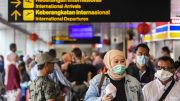So 2014 will be an exciting year for Indonesia. Mostly, of course, because of the elections. But also because, if things go well, a national health insurance scheme will be expanded to cover all Indonesians. It’s an incredibly ambitious plan. But in a wonderful report on BBC radio by Claire Bolderson, Health Minister Nasfsiah Mboi is optimistic. Asked if the government can achieve a target that appears to elude even the mighty United States, she replies “Inshallah, by 2014, we’ll be there”. You can listen to Claire’s report here (mp3), and I recommend that you do; my favourite scene is the nurse gilling fish on a ward in Makassar but there are some tragic tales of really good intentions frustrated, as well as of unnecessary death.
In theory, poorer Indonesians already get free healthcare through the Jamkesmas scheme. But in practice, Jamkesmas leads sick people into a rabbit warren of incomprehensible bureaucracy, and often offers third rate services. And it doesn’t only go to the poor. A useful World Bank report on the scheme (pdf) notes that “Not all of the poor are reached by the program, and there is considerable leakage to the non-poor.”
Speaking of leakage, who remembers Malinda Dee, the glamour puss owner of two Ferraris, a Mercedes and a Hummer? She argued that Jamkesmas should foot the bill to fix a botched breast enlargement. At the time her silicon sacks burst, the former “relationship manager” at Citibank was being held on charges of stealing 4.4 million dollars from her clients. Since she was a ward of the state, Malinda said, the Indonesian people should pay for her operation.
Few of the users of Jamkesmas are quite so undeserving. But Indonesia has one of the lowest ratios of doctors and of hospital beds to population of any country at its income level. If all poor people really were able to afford care from next year and immediately started to demand it, the system would be overloaded very quickly. That’s already happening in some parts of the country. In Papua, Indonesia’s easternmost province, indigenous Papuans are spurning (free) local clinics and travelling miles to hospitals because they think they will get better care. The rush to hospitals was so overwhelming that what they actually get is very long queues. When the nation’s capital Jakarta made health care free for all earlier this year, it turned in to exactly that: a free-for-all. People who had never had access to any higher level health care at all suddenly abandoned primary clincis and stampeded the hospitals, sometimes just because they could. Predictably, the result was chaos.
But I do find myself slightly agreeing with the sainted Jakarta Governor Jokowi when he said that with something as necessary as health insurance, it was better to get started and then iron out the wrinkles later than to drag one’s feet for ever. I don’t doubt that many Indonesians will be disappointed and frustrated by the roll-out of universal health insurance from next year. But I salute the government for even putting it on the national agenda, less than 70 years after independence. It took the United States more than 225 years to do the same; and they’re still working on the wrinkles, too.






Do you mean the upcoming BPJS-Kesehatan Program? I think this program is very promising. Next year will be the first time for many Indonesians to get access to affordable health insurance which will be provided by PT Askes as the executor of the BPJS-Kesehatan Program. In the past, only employees at certain companies or the civil servants that can join the Askes scheme. This BPJS-Kesehatan makes Askes accessible for everyone. Just last month I was having a discussion with a colleague who is a promoter of the BPJS. According to him, the procedure will be quite similar with the procedure in other countries, such as in the NL. A patient will need to see the general physician first or Puskesmas before being referred to a specialist or hospital. This procedure is now being practiced in Jakarta under the KJS program. Some parts of Elizabeth’s article on Jakarta’s health service are not fully correct. KJS is different from Jamkesnas and Jamkesda. For the KJS, Jokowi-Ahok cooperate with PT Askes to provide low cost health insurance services. Unlike Jamkesnas-Jamkesda where government money is free-flowing to hospitals and doctors (most were corrupted – the budget is usually last only until the first semester of FY), the KJS is managed using the system of PT Askes where strict costs standard applied as well as the control. In its first year, KJS faced a strong resistance from the health industry (mainly hospitals, doctors and pharmacy industry) since it applies a low cost mode and strict supervision over the insurance claims. This has resulted in the rejection of many patients by hospitals (as can be read in the link available in above article). Next year, I think BPJS-Kesehatan will experience the same problem. However, it can be expected that BPJS-Kesehatan will gain supports from many Indonesians. It promises a revolution of national health and insurance services where the costs of health and insurance will be made affordable. FYI, the Law on BPJS-Kesehatan includes heart by-pass surgery and hemodialysis. These two are the most expensive medical treatments, and will be fully covered by the program.